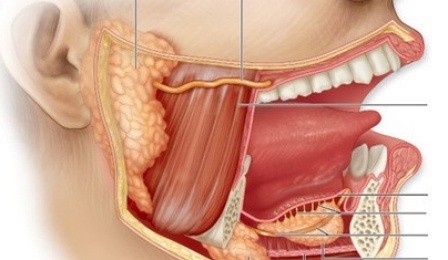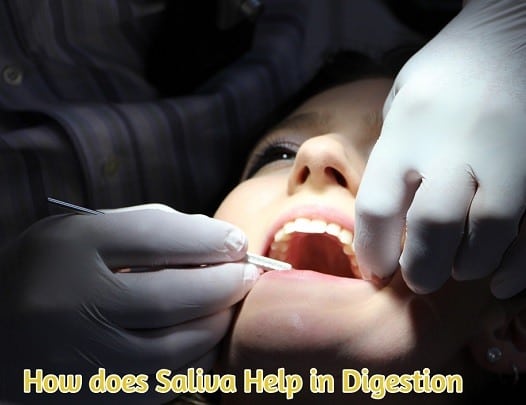Saliva is the first secretion of the digestive system. Here are five ways on how does the saliva help in digestion.
1. Chewing the food.
2. Sense of taste
3. Enzymatic digestion of larger carbohydrates
4. Lubrication of food for easy passage
4. Moistening and cleaning the mouth
5. Defense against microbes.
Saliva is secreted by the salivary glands in the mouth.

This saliva has enzymes, water, mucus, lysozymes, antibodies, etc. Based on these components in it, it does the following functions.
Chewing the food: The solid food we consume have to be broken down into smaller particles. This is done by teeth as we know it. However, the saliva moistens the food and makes it into a mass.
The tongue moves the moist mass right under the teeth for chewing. Thus food gets chewed better due to the involvement of saliva.
This chewing leads to smaller food particles with a greater surface area. Increased surface area enhances the exposure of food particles to the digestive enzymes.
Digestion of carbohydrates:
The saliva has an enzyme amylase. This enzyme amylase helps to digest larger carbohydrates to smaller forms. Starch is reduced to a disaccharide like maltose. This process of salivary digestion starts in the mouth and ends when the food enters the stomach.
The sense of taste: The food we eat is tasty because the taste buds feel the food. This taste buds can sense the taste only if the food is moist. Hence, saliva provides sufficient moisture to help in recognition of taste. Due to taste, we feel the desire to eat well and thereby we eat sufficient nutrition.
Also, you might have noticed that when you chew bread, you will feel it be slightly sweet after a while. This is because the starch in bread is converted to maltose which gives the sense of sweetness.
Lubrication of food material:
The food we eat is sometimes moist and sometimes dry. When the food material encounters saliva, it is moistened and made into a bolus. This moistening happens due to water content in the saliva. Due to this, the food bolus formed is soft and can easily slide into the stomach through the esophagus.
Hence, you might have noticed at times that when saliva is insufficient, you find it hard to swallow and require a glass of water to aid.
Cleansing the mouth:
Once we eat something, many food particles remain in the mouth. These are removed away by the secretion of saliva. Thus saliva helps to keep the mouth clean without the chance of growth of microbes.

When you feel your mouth with the tongue, you will notice it is moist and smooth. This smoothness is due to the mucus secretion in saliva.
Defense against foreign microbes:
The saliva has lysozymes and immunoglobulins (antibodies). Lysosomal enzymes destroy the cellular material of foreign microbes. Besides, the antibodies present in saliva can neutralize microbes. These immunoglobulins bind to the antigen of bacteria and virus helps in their destruction. Thus saliva minimizes the chances of live pathogens entering into the gut and the body.
Very good
Wow! I never knew saliva was instrumental in killing pathogens! What an amazing creator we have! Question tho. Regarding smoothies, does drinking them in liquid form minimize the therapeutic effect of the saliva, as we don’t chew and there is minimal saliva exposure?
Nancy, drinking smoothies lead to minimal exposure to salivary action. So the chances of digesting the carbohydrates and killing any microbes in the smoothies are minimized. However, the gastric juice in the stomach will do the act instead. The hydrochloric acid released in the stomach kills microbes and the amylase enzyme in the gastric juice will digest the carbs.